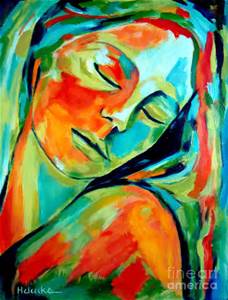











Before discussing what AROMA-PSYCHOLOGY means to you or me, I just want to say a few words about the linguistic of aroma, the new language which is expanding by day. The word aromatherapy refers to the clinical use of essential oils combined with physical therapy - usually in the form of massage or inhalations. Aromatherapists go through very different degrees of training - from a few weekend courses to many years of intense anatomy, physiology, chemistry, body-work massage skills.
Fully-trained aromatherapists perform work which cannot always be done at home, and their services are sometimes indispensable. A very small minority of aromatherapists have a more medical leaning. While the majority tend towards stress-management. There are also beauticians and cosmotologists who are using essential oils and essential products and call what they are doing 'aromatherapy'. This is the 'beauty and relaxation' end of the aromatherapy spectrum. To some degree, anyone can be an 'aromatherapist' in that much of the information required is available, and the methods do not always need outside help - one can do them at home.
Because there is so much more to essential oils than their use in a 'clinical' setting or even for medicinal use within the home, several other expressions have grown up. The aromatherapist Professor William Arnold-Taylor first coined the term aroma-tology in 1981, and he meant by it 'aromatherapy for the whole person' - body, mind, and spirit. this is a very wide term encompassing using essential oils to reform character and personality characteristics, and to enhance spirituality. It's a good term if you want to indicate the depths of influence essential oils can have.
The word aroma-chology is a trademark of the Olfactory Research Fund (formerly the fragrance foundation) a research institution that supports the flavours and fragrance industries. Whether referring to the use of synthetics or natural essential oils, aroma-chology is to do with influencing the mind. It encompasses the development of aromas to attract buyers into a shop and make them linger there longer, and of aromas to make keyboard operators efficient, or customers more relaxed. The research doesn't stop here. Indeed, for many years government defence departments have been exploring ways in which aroma can control crowds or influence the behaviour of the enemy.
Aroma-psychology specifically refers to the use of essential oils to positively effect the mind - such as memory enhancement, learning improvement, mood uplifting, and confidence boosting. These mental stimulations are currently being utilized by a wide range of organisations. Because the mind and body are an integrated unit, the term aroma-psychology is somewhat unsatisfactory, as is psyco-aromatherapy, which for some people conjures up images from the shower scene in Alfred Hitchcock's movie, Psycho. But they are still useful to denote the degree to which the mental or bodily functions are involved at any one time.
For example, if you burn your hand and put lavender oil on it, that's a physical application although the lavender will also help with the shock and make you more relaxed. We would call that aromatherapy. On the other hand, if you're having a party and want the room to smell nice and make your guests relaxed, you might put some geranium, cinammon and melissa in a room diffuser before they arrive. The fact that these will help prevent one guest passing a nasty flu virus to another is an added bonus! This situation is aroma-psychology bordering on aromatherapy.
Man-made chemical odourants do not have the ability to perform antibacterial or antiviral activities, and although now there is a vast industry which attempts to replicate the aromas of essential oils, what they produce can in no way be compared to essential oils. It is difficult to find analogies to illustrate the difference. Perhaps one could compare essential oils to a music concert, and man-made synthetic aromas to a recording of that concert.
Technicians might say the recording can improve on the real event, because in the studio they can over-dub, add echo, and 'drop-in' notes or words which were less than perfect at the time of the performance. This is true, but the concert has an atmosphere, an excitment, and is a total experience in a way a recording can never be. The analogy can never really work, however, because the music in the concert will be different - and better, vibrationally and energetically - than the recording .
Reference: The Fragrant Mind: V.A.Worwood
- Home
- Addiction
- JASMINE- Floral - Jasminum Officinale,J. grandiflorum, J.sambac
- History of Drugs-4
- History of Drugs
- History of Drugs-3
- The Somatid Connection
- Rosemary-Personality-Profile
- Personality In Perfumery
- Cinnamon - Personality profile
- Personality Tests
- The Water Connection
- Mind-Mood-Emotion-Quick Reference Chart - S - Un
- History of Drugs-5
- Mind-Mood-Emotion-Quick Reference Chart - Un - W
- Emotional-Healing Problems-A-B-Positive and Negative Mood Charts
- Emotional-Healing Problems-B-H-Positive and Negative Mood Charts
- How Essential Oils Work On the Brain
- Cardamom Personality Profile
- Essential Oils Used For Emotional Healing-A-M
- Lavender- Floral/Herbie
- Positive Mind, Mood & Emotion - Alertness
- Juniper personality profile
- JASMINE- Floral - Jasminum Officinale,J. grandiflorum, J.sambac
- HYACINTH - Floral - Hyacinthus Orientalis
- Emotional Healing Introduction - 2
- Emotional Healing Introduction
- Memory Enhancement, Mental Clarity and Efficiency
- How To Get Through Life In One Piece
- HELICHRYSUM (Immortelle or Italian Everlasting)
- GRAPEFRUIT - Fruitie - Citrus paradisi
- The Art Of Smelling - Which Method - Aromaprofiles
- The Art Of Smelling
- GINGER PERSONALITY PROFILE
- Geranium - Pelargonium graveolens Personality Profile
- Frankincense Resinie - Boswellia Carteri
- Quality and Purity - 2 - AromaProfiles
- Quality and Purity - AromaProfiles
- ChemoTypes - AromaProfiles
- Adaptogens - AromaProfiles